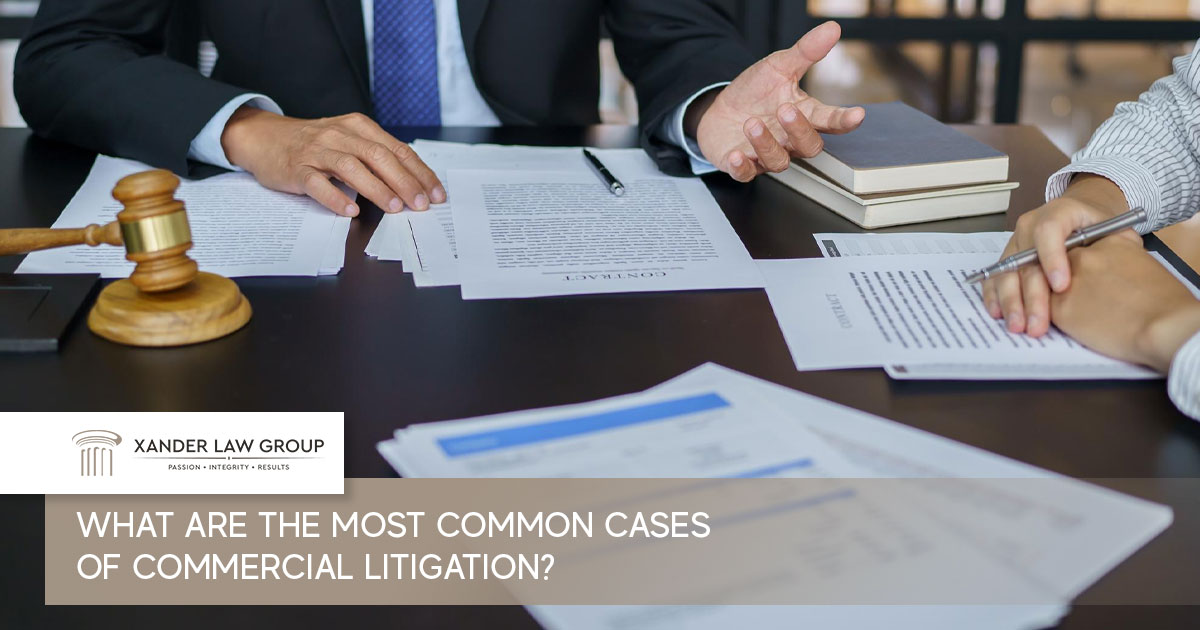What Are The Most Common Cases Of Commercial Litigation?
Commercial litigation is one aspect of business law that assists parties with business-related legal disputes. It can include any type of business law including contracts, shareholder disputes, and intellectual property. Unlike civil litigation which encompasses individuals, organizations, and businesses, commercial litigation is solely between businesses or commercial entities.
How Is Commercial Litigation Different From Civil Litigation?
Commercial lawsuits differ from civil lawsuits in several ways and understanding the difference can help you better understand commercial lawsuits. In civil matters, it’s generally between an individual and potential organizations that are seeking financial compensation instead of penal measures (i.e. incarceration, community service, and more).

Most Common Cases Of Commercial Litigation
There are a wide variety of commercial lawsuits, and a better understanding of some of these matters can help you decide how to proceed.
-
Demand Letters & Pre-Suit Negotiations
Demand letters and pre-suit negotiations are used as a pre-emptive measure. They are used to resolve commercial disputes before they escalate into a lawsuit. The letter is a formal written request sent by your legal representative to the other party. It will outline all the relevant information including the cause of the lawsuit, specifying the restitution sought, and serve as a notice for formal legal action if the demands are not met. It serves as a legal record that attempts were made to resolve things outside of court.
Pre-suit negotiations are the conversations or exchanges between parties attempting to resolve the issue. The end goal of these negotiations is to reach a mutually beneficial solution through mediation or settlement offers.
-
Settlement Agreements
A settlement agreement is the next necessary step, it is a legally binding contract that will resolve the dispute without the matter being heard in court. The agreement outlines various compromises each party will make to avoid any uncertainty later. It also includes payment or non-monetary terms. These agreements can include a clause on confidentiality which keeps the terms of the agreement confidential.
-
Civil Complaints & Answering Civil Complaints
Some civil matters can also be commercial matters. A civil complaint is a formal legal document that is filed by the party initiating the lawsuit (known as the plaintiff) stating the claims that are being made against the other party (known as the defendant).
In commercial lawsuits, these types of complaints involve disputes between businesses or are related to business transactions. When answering a civil complaint, the defendant must respond within a set timeframe.
-
Breach of Contract
If both parties agree to set terms within a legally binding document and one party does not fulfill their obligations it would count as a breach of contract. These could be non-delivery / non-provision of goods or services or failure to pay for goods & services. For example, in a settlement agreement, if Party A agrees to pay Party B X an amount of money but does not – it would be a breach of contract.
-
Breaches of Promissory Notes
As a promissory note is a form of legal documentation, a breach can occur if one party fails to fulfill their obligation to pay the specified amount within the set time frame. It is generally used in financial transactions for things such as loans.
-
Commercial Real Estate Disputes
Commercial real estate disputes can include a variety of issues that arise in commercial real estate. This includes matters relating to leases, developments, and even property management.
Other types of commercial lawsuits relating to real estate disputes include property use and zoning, purchase & sale disputes, and even landlord & tenant disputes. Parties involved include owners/landlords, investors, developers & contractors, tenants, and in some instances government entities.
-
Commercial Fraud
This is fraud committed by individuals or businesses regarding commercial transactions, for example, if one party has attempted to secure an unlawful financial gain over the other. Commercial fraud can impact businesses, consumers, and investors. Examples of commercial fraud include false representation, fraudulent financial reporting, investment & contract fraud, bankruptcy fraud, and more.
-
Business (Economic) Tort
This refers to acts that can negatively impact a business or its assets. Negative impacts include financial loss or reputational damage. If your business suffers financial harm due to the actions of another person or business, you can file a lawsuit to recover some of the damages.
There are a variety of business torts including fraud & misrepresentation, interference, unfair competition, disclosure of trade secrets, and defamation.
Other types of commercial lawsuit-related matters include:
- Complex litigation
- Defamation
- Theft of intellectual property
- Replevin
- Non-compete breaches
- Trademark disputes,
- and any other business litigation matters.
For the above-mentioned matters, it’s best to consult with a licensed and reputable commercial litigation lawyer.

Finding a Commercial Litigation Lawyer in Miami
If you need the help of an attorney experienced in commercial law, the team at Xander Law Group has years of experience dealing with commercial lawsuits.
For more information on our commercial litigation services, contact our Miami-based legal team today.









